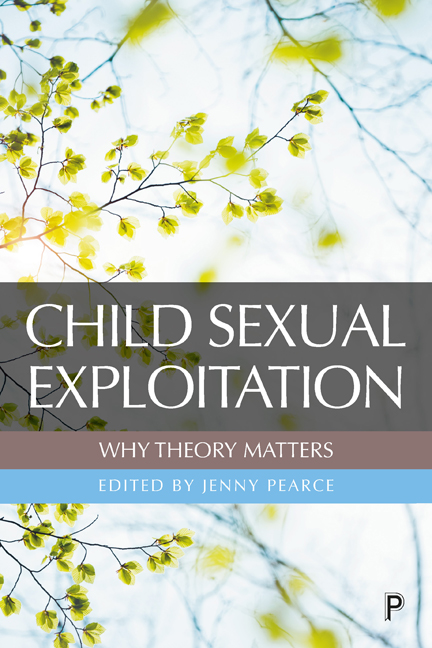Book contents
- Frontmatter
- Contents
- List of Figures and Tables
- Notes on Contributors
- Editor’s Acknowledgements
- Foreword
- 1 Bringing Theory Home: Thinking About Child Sexual Exploitation
- 2 Moving Beyond Discourses of Agency, Gain and Blame: Reconceptualising Young People’S Experiences of Sexual Exploitation
- 3 Child Sexual Exploitation, Discourse Analysis and why we Still Need to Talk About Prostitution
- 4 Contextual Safeguarding: Theorising the Contexts of Child Protection and Peer Abuse
- 5 ‘Losing Track of Morality’: Understanding Online Forces and Dynamics Conducive to Child Sexual Exploitation
- 6 Understanding Adolescent Development in the Context of Child Sexual Exploitation
- 7 Some Psychodynamic Understandings of Child Sexual Exploitation
- 8 Understanding Trauma and its Relevance to Child Sexual Exploitation
- 9 Social Support, Empathy and Ecology: A Theoretical Underpinning for Working with Young People who have Suffered Child Sexual Abuse or Exploitation
- 10 Using an Intersectional Lens to Examine the Child Sexual Exploitation of Black Adolescents
- 11 What’s Gender Got to do With It? Sexual Exploitation of Children as Patriarchal Violence
- 12 Understanding Models of Disability to Improve Responses to Children with Learning Disabilities
- 13 Some Concluding Thoughts
- Index
10 - Using an Intersectional Lens to Examine the Child Sexual Exploitation of Black Adolescents
Published online by Cambridge University Press: 10 March 2021
- Frontmatter
- Contents
- List of Figures and Tables
- Notes on Contributors
- Editor’s Acknowledgements
- Foreword
- 1 Bringing Theory Home: Thinking About Child Sexual Exploitation
- 2 Moving Beyond Discourses of Agency, Gain and Blame: Reconceptualising Young People’S Experiences of Sexual Exploitation
- 3 Child Sexual Exploitation, Discourse Analysis and why we Still Need to Talk About Prostitution
- 4 Contextual Safeguarding: Theorising the Contexts of Child Protection and Peer Abuse
- 5 ‘Losing Track of Morality’: Understanding Online Forces and Dynamics Conducive to Child Sexual Exploitation
- 6 Understanding Adolescent Development in the Context of Child Sexual Exploitation
- 7 Some Psychodynamic Understandings of Child Sexual Exploitation
- 8 Understanding Trauma and its Relevance to Child Sexual Exploitation
- 9 Social Support, Empathy and Ecology: A Theoretical Underpinning for Working with Young People who have Suffered Child Sexual Abuse or Exploitation
- 10 Using an Intersectional Lens to Examine the Child Sexual Exploitation of Black Adolescents
- 11 What’s Gender Got to do With It? Sexual Exploitation of Children as Patriarchal Violence
- 12 Understanding Models of Disability to Improve Responses to Children with Learning Disabilities
- 13 Some Concluding Thoughts
- Index
Summary
Introduction
In this chapter I employ intersectionality as a critical lens to interrogate the ways that race, gender, class and sexuality impact black adolescents’ experiences of child sexual exploitation (CSE). In particular, the exploration will be anchored in an intersectional analysis to extend understandings of the nuanced ways in which race-constructed otherness is experienced by young black people affected by sexual exploitation. ‘Black’ is defined here as referring to individuals of African and African-Caribbean origin as well as persons of mixed ethnicity (African or African-Caribbean and another parentage, usually white British). A key reason for focusing on this subgroup of children is that they are disproportionately represented in the care system (Owen and Statham 2009) and the data on CSE suggests that children in the care system are disproportionately affected (Pearce 2009; Beckett et al 2013; Beckett et al 2017). The central argument is that positional and situational inequalities intersect in complex ways which have a negative impact on the everyday realities of black youth, thus rendering them vulnerable to sexual exploitation. Specifically, the chapter discusses the contribution that an intersectional frame of analysis can make to intervening with sexually-exploited black youth. The chapter is organised into three parts: the first section briefly sketches the key messages from the literature on CSE and black children. The second provides an overview of the intersectionality theoretical framework of the chapter. In the final section, using a case study, from the Serious Case Review (SCR) of child R, a 15-year-old black girl in the looked-after system, as an exemplar, I will present ways that an intersectional lens can offer some analytical tools to gain a deeper insight into the challenges for black youths at risk of abusive and exploitative relationships. The chapter concludes with some discussion of the implications for a child-focused approach are also discussed.
Child sexual exploitation and black children
While it is well known that CSE affects children and young people from all backgrounds, little is known about the scale and nature of black children's experiences of CSE. Research indicates that girls are more likely than boys to be the victims of sexual exploitation, though boys are also sexually exploited (Pearce 2009; Berelowitz et al 2013).
- Type
- Chapter
- Information
- Child Sexual Exploitation: Why Theory Matters , pp. 193 - 208Publisher: Bristol University PressPrint publication year: 2019



